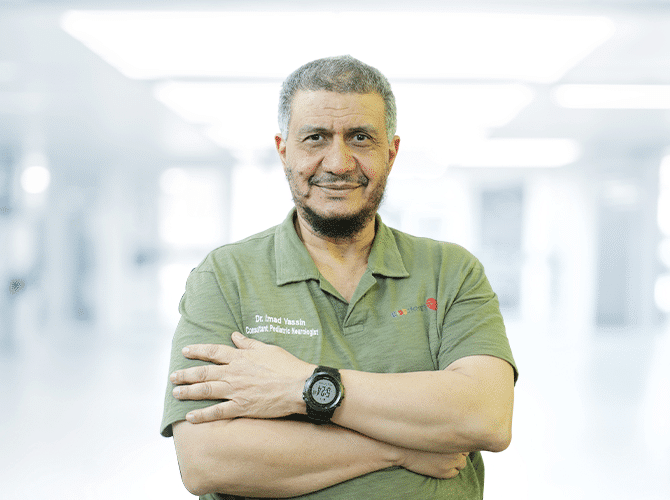Auditory Brainstem Response (ABR)
Auditory Brainstem Response (ABR)
Silent Signals, Sound Answers — Understanding Hearing Beyond the Ears

At KidsHeart Medical Center, we know how vital early hearing is to a child’s speech, learning, and social development. But sometimes, the concern isn’t with the ears — it’s with how the brain processes sound.
Auditory Brainstem Response (ABR) testing helps us assess how sound signals travel from the ear to the brainstem.
It’s essential for children who can’t complete standard hearing tests — especially infants or those with developmental delays.
Our Pediatric Neurology and audiology teams offer ABR testing in supportive, calm environments across Abu Dhabi, Dubai, and Al Ain.

What Is an ABR Test?
ABR is a non-invasive test that checks the electrical activity of the hearing nerves and brainstem in response to sound.
Here’s how it works:
- Small electrodes are placed on the child’s head
- Soft clicking sounds are played through earphones
- The brain’s response to each sound is recorded and analyzed
This allows us to:
- Detect hearing loss in infants and young children
- Assess hearing when standard tests aren’t possible
- Evaluate neurological causes behind auditory concerns
- Monitor children with known risk factors (e.g., NICU stay, family history)
When Should Your Child Have an ABR Test?
Consider ABR testing if your child:
- Failed a newborn hearing screening
- Isn’t responding to sounds or name consistently
- Has delayed speech or unclear pronunciation
- Has developmental delays or autism with unclear hearing status
- Was born premature or had a NICU stay
- Is suspected to have auditory neuropathy or brainstem dysfunction
ABR helps answer, “Can my child hear — and is their brain processing that sound?”
What to Expect During the ABR
Here’s how we make the process smooth and reassuring:
- Gentle Preparation: The child rests quietly or sleeps — no active response is needed.
- Electrode Placement: Soft stickers are placed on the forehead and behind the ears.
- Sound Stimulation: Clicking sounds are delivered via small earphones.
- Monitoring Response: The system tracks how the brainstem reacts to each sound.
- Result Review: Pediatric Neurologists and audiologists interpret results and discuss next steps.
In infants, the test is often done during natural sleep or with mild sedation, if required.
Why Families Trust KidsHeart
- Pediatric Neurologists with brainstem and hearing expertise
- Experienced audiology support for accurate interpretation
- Calm settings ideal for infants and neurodiverse children
- Clear next steps — from diagnosis to intervention planning
- Clinics available in Abu Dhabi, Dubai, and Al Ain
Because understanding hearing is more than checking ears — it’s reading signals from the brain.


Dr. Imad Yassin
Consultant Pediatrician/ Pediatric Neurologist – FRCPCH(UK) | Facharzt, FAMAP, Pediatric Neurology Cert (Austria)
Concerned About Your Child’s Hearing or Response to Sound? We Can Help.
If there are signs your child isn’t hearing well — or processing sound clearly — we’re here to check gently and guide confidently.
Frequently Asked Questions (FAQs)
No. It’s non-invasive, silent, and doesn’t require your child to respond.
It’s very effective, especially for sensorineural and brainstem-level hearing concerns.
We often perform ABR during sleep or, in some cases, under mild sedation.
Usually 30–90 minutes, depending on whether one or both ears are tested.
We guide you through further evaluation, possible hearing aids, or therapy referrals.

